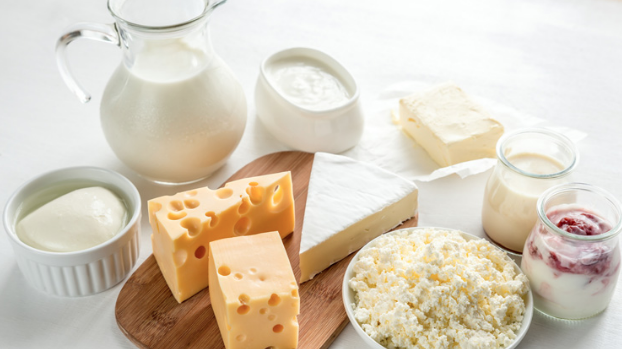Originally featured in Organic Life.
I Have A Dairy Sensitivity...Here’s How Dairy-Free Probiotics Helped Tame My Symptoms
Find out why probiotics, a.k.a. friendly bacteria, are so good for your gut…
Dairy allergies and sensitivities are not at all uncommon. If you don’t have an issue with dairy, you probably know someone who does.
Dr. Mary Ellen Sanders, executive science officer for the International Scientific Association for Probiotics and Prebiotics, says true dairy intolerance can go one of two ways. “People can be lactose intolerant, which means they do not produce sufficient lactase to digest the lactose in dairy products,” says Sanders.
The other option? An allergy to dairy protein. She notes this path “is quite rare in adults, although about 2% of children can have this allergy.” A dairy allergy can cause a reaction that runs the gamut from diarrhea to abdominal pain to hives.
CLICK HERE TO BUY DAIRY-FREE PROBIOTICS
People with a lactose intolerance don’t experience a true allergic response. If you have a lactose intolerance—as I do—the lactose in dairy products goes into the large intestine undigested. From there, it’s metabolized by gut microbes which gives you not-so-fun side effects, such as diarrhea, cramps, bloating, gas, and more.
One way to avoid these symptoms is to not consume cow’s milk. But if you find cheese and other dairy products delicious, [dairy-free] probiotics can help. (Want to avoid dairy but still crave cheese-filled meals? Try these tips for cooking with vegan cheese.)
Since jumping on the probiotic food and drink bandwagon, I’ve noticed my body tolerates dairy significantly better. I’ve stopped being super careful watching out for dairy, and can even eat pizza again. The changes aren’t just stomach-related. My skin used to break out at the sight of milk, but now I’m zit-free—despite ingesting dairy.
WHY DO PROBIOTICS MAKE SUCH A DIFFERENCE?
I’m not the only one who has benefited from using probiotics to ease their dairy (and other!) sensitivities. Anecdotal evidence is everywhere. For a scientific take, I spoke with Kiran Krishnan, microbiologist and chief science officer of Just Thrive Probiotic.
Here’s the first thing I wanted to know: What are probiotics actually doing to your gut? What makes the bacteria into the digestion-easing powerhouse that I know and love? First and foremost, says Krishan, not all probiotics are even functional in the digestive tract. Those that are, though, can help digestion in several ways.
Probiotics help move things along, says Krishan. “They improve bowel movement, which is important to keep the food from getting ‘stuck’ or taking too long to clear the system, thus leading to putrefaction.” Lovely! Probiotics can also help to break down and digest the food for you, making the nutrients within food available for absorption.
CLICK HERE TO BUY DAIRY-FREE PROBIOTICS
Probiotics can also change food while you’re digesting it. Krishnan gave the example of converting food to B vitamins, and other metabolites. “These metabolites play critical roles in managing metabolism, lowering inflammation, increasing fat burn, and maintaining a healthy immune system,” he says. Probiotics also ease digestive issues like gas or bloating.
Basically, probiotics can help your whole gut be its best possible version. But what about people with dairy intolerance? There aren’t large scientific studies looking at how probiotics act for people with dairy intolerance specifically, but there is scientific evidence for allergies in general. One large study found that consuming probiotic foods “significantly reduced prevalence of allergies and asthma.”
From this, and the many other smaller studies around probiotics and allergies, Krishnan says it’s a reasonable hypothesis that probiotics may improve people’s reactions to dairy. “Some strains can even break down lactose at high levels, which will certainly alleviate dairy sensitivity,” he notes.
IT’S WORTH A TRY—IF YOU’RE LACTOSE INTOLERANT
“If a person is lactose intolerant, consuming a probiotic containing either or both live Lactobacillus bulgaricus and Streptococcus thermophilus can improve tolerance,” says Sanders. These two different microbes can metabolize the lactose for you. “This effect has been recognized by the European Union,” she says, “and is allowed as an approved claim on yogurts.”
CLICK HERE TO BUY DAIRY-FREE PROBIOTICS
Lactobacillus bulgaricus and Streptococcus thermophilus can be found in many probiotic supplements, as well as in yogurt, and some fermented foods and drinks like kombucha. Unfortunately for the small percentage of people with a dairy protein allergy, [these types of] probiotics won’t change the reactions, says Sanders. Instead, she recommends talking to your doctor about treatment options.
If you have lactose intolerance and you want to get your gut in gear to be able to handle dairy, [dairy free] probiotics may just do the trick! It’s always a good idea, however, to speak with your doctor before adding supplements or doing a radical diet change. Also, you don’t want to jump head-first into a diet of probiotic-food-filled diet if you’re not used to it. Starting off with too many probiotics may just do the opposite of what you’re looking for and make stomach issues temporarily worse. Side effects, as always, can include diarrhea, bloating, and gassiness.
Instead, pop a spoonful of sauerkraut onto your salad for lunch, try half a glass of kombucha, or finally try kimchi with your weekly take out order (or even make your own!). Just don’t do it all in one day.
If you're looking for dairy-free probiotics, Just Thrive Probiotic is for you.
CLICK HERE TO BUY DAIRY-FREE PROBIOTICS
The post Lactose Intolerant? Probiotics Can Help… appeared first on Thrive Probiotic.









